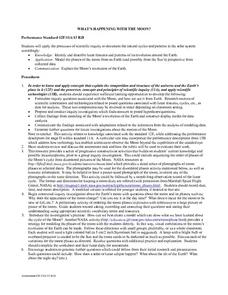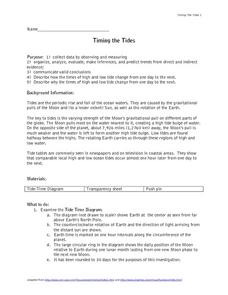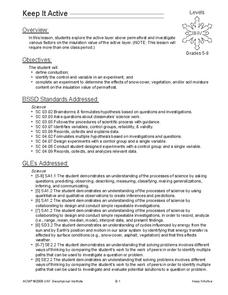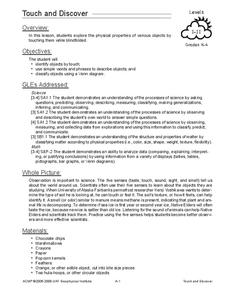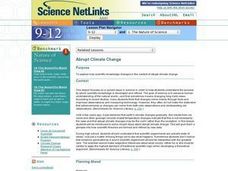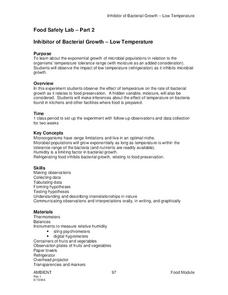Curated OER
Reflecting on Reflectivity
Students plan and construct a "mini-lab" to measure the reflectivity of different earth surfaces. They measure reflectivity of materials, including ice, soil, rocks, etc., and then extrapolate from what they have learned to consider the...
Curated OER
The Colors of Chemistry
Students investigate the acidity and alkalinity of common household products in an experiment. They use red cabbage juice and litmus paper to show the difference between strong acids and bases as they work with vinegar, dish washing...
Curated OER
The Science Of Mummies
High schoolers explore how new advancements in technology can lead to advancements in scientific knowledge, and specifically how new technologies are advancing the study of mummies.
Curated OER
Plastics and Rubber: What's the Difference?
Students classify household items into either plastic or rubber. In this chemistry lesson, students justify their classification system. They explain the difference between observation and inference.
Curated OER
The Human Body Systems - Lesson Plan
Students identify the following organ systems in the human body and state their functions: muscular, skeletal, circulatory, respiratory, digestive.
Curated OER
The Brain and the Sense Organs - Lesson Plan
Students identify the five sense organs and state the uses of the five senses.
Curated OER
What's Happening With the Moon?
Young scholars review the process of scientific inquiry. Using this information, they identify the patterns and cycles of the moon as it revolves around the Earth. In groups, they model the phases of the moon from the Earth and Sun's...
Curated OER
Timing the Tides
Students collect data and describe how and why the high and low tides change from day to day. In exploring tides lesson students study tides by taking notes, recording data and analyzing their findings.
Curated OER
The Water Cycle
Fifth graders identify organisms and processes involved in three cycles: the water cycle, the carbon cycle, and the nitrogen cycle. They produce a pictorial or abstract water cycle, and appropriately place life forms onto an existing...
Curated OER
Introduction to Scientific Method
Students investigate safe laboratory procedures, classroom management guidelines, and group roles and procedures. They study a set of safety guidelines with their parents, and to sign a contract stating that they understand the...
Curated OER
Keep it Active
Young scholars explore the active layer above permafrost and investigate various factors on the insulation value of the active layer. In this energy transfer lesson, students conduct and experiment to determine the effects of snow...
Curated OER
Sea Ice: Unscrambling the Egg Code
Students determine sea ice thickness, concentration, and floe size by reading egg codes. In this sea ice conditions lesson, students color code a map based on prescribed criteria and use the maps to identify changes in sea ice...
Curated OER
Cooler in the Shadows
Students explore how the amount of sunlight and heat change in areas that are shaded.
Curated OER
Touch and Discover
Students identify the physical properties of items using the sense of touch. In this touch and discover lesson, students describe items. Students sort items using a Venn diagram.
Curated OER
Abrupt Climate Change
Students explore how scientific knowledge changes in the context of abrupt climate change. They are introduced to some recent ideas about abrupt climate change. This gives them a glimpse into how scientific theories are formed and...
Curated OER
Frost Depth
Learners explore the concept of frost depth. In this frost depth lesson, students conduct a scientific investigation that requires them to use a frost tube to measure, record, and graph frost depth data.
Curated OER
DISCOUNT LENSES ( GELATIN WAVE GUIDES)
Students study attributes associated with concept of fiber optics is done using a labmade fiber optic from clear molded gelatin. A variety of shapes can be cut and pieced together to form a conduit to transmit the laser beam by internal...
Curated OER
Ooblek
Learners demonstrate the three states of matter. In this matter lesson, students read Bartholomew and the Ooblek. Learners create "ooblek" and discuss what state of matter it is.
Curated OER
Death On Board La Belle: Finding Clues from Old Bones
Students practice analyzing skeletal remains for clues by using the Internet. In this scientific investigation lesson, students research the La Belle shipwreck using the Internet and written materials, later completing a Skeletal...
Curated OER
Food Safety Lab
Students use the scientific method to investigate the role of temperature in microbial growth. In this food preservation lesson, students set up an experiment with fruit in room temperature and in a refrigerator. They record the...
Curated OER
Convection and Wind
Students use water, beakers, hot plates, paper dots, and goggles to participate in a hands on activity where they see how a convection current creates wind. In this convection current lesson plan, students participate in a hands on...
Curated OER
Timekeeping by the Sun
Students measure shadows to learn about the Sun-Earth relationship. In this astronomy lesson, students create a shadow stick of a Pokemon character and record measurements of its shadow in a data chart. Follow-up discussions guide...
Curated OER
Timeline of Extreme Weather Events
Students research and chart extreme weather events on a timeline. In this extreme weather lesson, students interview older people who have experienced extreme weather events. Students complete a worksheet based on the information of the...
Curated OER
Scientific Method
Students examine the steps of the scientific method. They define related vocabulary terms, view a PowerPoint presentation, and apply and identify the steps of the scientific method for an online experiment scenario.








